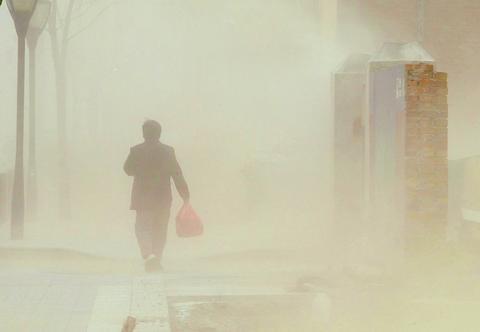Dangerous dust storms in Asia have intensified fivefold over the past half-century, posing health and economic hazards as part of global trend toward bigger natural disasters, the UN warned yesterday.
The dust storms originate in the desert regions of Mongolia and increasingly China, where 30 percent of the land is parched by over-farming, overgrazing, deforestation and changing weather patterns, the UN Environment Program (UNEP) said.

PHOTO: AP
The sands whip up as far away as the Korean Peninsula, Japan and the Pacific basin, for a combined economic loss of US$6.5 billion a year, UNEP said.
Cities like Seoul become shrouded in a haze of "yellow dust" that sometimes leaves a film of grit. In severe cases, it forces school closures and airline cancelations, can disrupt communications and damage crops and livestock.
Unlike similar storms from Africa's remote Sahara Desert, the Asian storms pose serious health risks because the dust particles pick up toxic pollutants from Chinese industry.
During a South Korean dust storm in April 2002, dust levels reached 2,070 micrograms per cubic meter, twice the level deemed hazardous to health, UNEP said.
Since the 1950s, the frequency of Asian sand storms has increased five times, UNEP said. The Gobi Desert in China alone expanded by 52,400km2 from 1994-1999, according to UNEP's GEO Global Year Book.
The new findings were released as environment ministers from around the world gathered at a UN environment summit aimed at sustainable development.
Ironically, the news comes a day after the Korea Meteorological Administration issued a dust alert for much of South Korea, urging care for those with respiratory problems.
"We are worried about the creep of environmental problems -- their disrespect of political boundaries -- and the way they threaten to compound and disrupt the functioning of major natural systems," UNEP executive director Klaus Toepfer said.
The dust storms are part of a larger trend of increasing natural disasters, UNEP said.
It cited the record heatwave in Europe that killed thousands last summer, widespread flooding in China that left millions homeless last July, the recent appearance of a hurricane in the South Atlantic for the first time and a record season of tornadoes in North America.
The cost of damage from dust storms, hurricanes, tornadoes and other weather-related catastrophes topped US$60 billion for the first time last year, according to UNEP.
About 80 percent of such disasters worldwide occur in Asia, affecting 1.7 million people and inflicting US$369 billion in damage from 1991-2001.
UNEP is working with governments and the Asian Development Bank on a US$1 million early warning system for dust and sand storms in the region. The system will use a network of monitoring stations to standardize data.
Recent research shows that dust storms originating from the Sahara Desert trigger algae infestations of coral reefs as far away as the Caribbean Sea.
Those sands pose less of a risk to human health because they are relatively cleaner than the Asian variety, UNEP spokesman Nick Nuttall said.

Auschwitz survivor Eva Schloss, the stepsister of teenage diarist Anne Frank and a tireless educator about the horrors of the Holocaust, has died. She was 96. The Anne Frank Trust UK, of which Schloss was honorary president, said she died on Saturday in London, where she lived. Britain’s King Charles III said he was “privileged and proud” to have known Schloss, who cofounded the charitable trust to help young people challenge prejudice. “The horrors that she endured as a young woman are impossible to comprehend and yet she devoted the rest of her life to overcoming hatred and prejudice, promoting kindness, courage, understanding

Tens of thousands of Filipino Catholics yesterday twirled white cloths and chanted “Viva, viva,” as a centuries-old statue of Jesus Christ was paraded through the streets of Manila in the nation’s biggest annual religious event. The day-long procession began before dawn, with barefoot volunteers pulling the heavy carriage through narrow streets where the devout waited in hopes of touching the icon, believed to hold miraculous powers. Thousands of police were deployed to manage crowds that officials believe could number in the millions by the time the statue reaches its home in central Manila’s Quiapo church around midnight. More than 800 people had sought

DENIAL: Pyongyang said a South Korean drone filmed unspecified areas in a North Korean border town, but Seoul said it did not operate drones on the dates it cited North Korea’s military accused South Korea of flying drones across the border between the nations this week, yesterday warning that the South would face consequences for its “unpardonable hysteria.” Seoul quickly denied the accusation, but the development is likely to further dim prospects for its efforts to restore ties with Pyongyang. North Korean forces used special electronic warfare assets on Sunday to bring down a South Korean drone flying over North Korea’s border town. The drone was equipped with two cameras that filmed unspecified areas, the General Staff of the North Korean People’s Army said in a statement. South Korea infiltrated another drone

Cambodia’s government on Wednesday said that it had arrested and extradited to China a tycoon who has been accused of running a huge online scam operation. The Cambodian Ministry of the Interior said that Prince Holding Group chairman Chen Zhi (陳志) and two other Chinese citizens were arrested and extradited on Tuesday at the request of Chinese authorities. Chen formerly had dual nationality, but his Cambodian citizenship was revoked last month, the ministry said. US prosecutors in October last year brought conspiracy charges against Chen, alleging that he had been the mastermind behind a multinational cyberfraud network, used his other businesses to launder